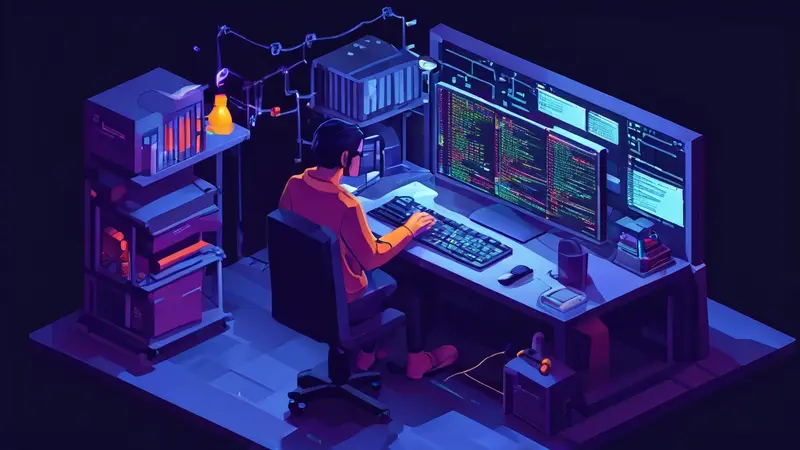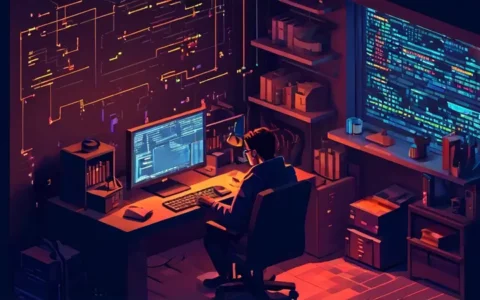
ABSTRACT
Programming requires a synergetic blend of analytical thinking, problem-solving skills, and creativity. The need for meticulous attention to detail and the ability to think abstractly about complex systems are fundamental. 1、Analytical thinking is about breaking down problems systematically, understanding the components of the system, and how they interact. For example, when composing a function or an algorithm, a programmer must consider not just the immediate task at hand but also its implications on the rest of the application.
I. ANALYTICAL THINKING
Analytical thinking is the keystone in programming. It enables developers to dismantle complex problems and synthesize solutions systematically. Effective programmers use this skill to identify the root causes of issues and predict how individual components of code will interact, laying a solid foundation for robust program design. This approach often necessitates a deep dive into data structures, algorithms, and computational theory, ensuring every aspect is addressed with precision.
II. PROBLEM-SOLVING SKILLS
Possessing sharp problem-solving skills is another non-negotiable aspect of programming. Programmers face myriad challenges daily, ranging from debugging intricate code to optimizing system performance. Those with strong problem-solving abilities excel at formulating logical solutions to these puzzles by methodically eliminating potential sources of error, a technique integral to the development cycle.
III. ATTENTION TO DETAIL
Attention to detail is what differentiates good code from great code. It encompasses not only spotting errors or bugs in a program but also involves meticulous code reviews, disciplined testing practices, and a commitment to creating clear, maintainable code. A detail-oriented programmer considers every possible scenario a program might encounter and preemptively addresses potential issues, resulting in flawless execution of the software.
IV. ABSTRACT THINKING
Abstract thinking allows programmers to conceptualize complex systems beyond tangible entities. It fosters the ability to envision and manipulate components and their relationships within a program's architecture. Programmers must build mental models of how various elements interact, often visualizing the flow of data and the integration of modules without writing actual code. This skill is particularly crucial in large-scale system design, where strategic planning far precedes implementation.
V. CREATIVITY
Creativity is the spark that ignites innovation in programming. Unique problems require unique solutions, and thinking outside the traditional confines of established practices can lead to breakthroughs. It involves generating new ideas, exploring alternative approaches, and the willingness to experiment. This creative process often leads to the development of user-friendly interfaces, feature-rich applications, and ultimately, a satisfying user experience.
VI. COLLABORATIVE MINDSET
Programming is rarely a solitary endeavor. It often involves collaboration with other developers, clients, and stakeholders. A collaborative mindset not only includes effective communication skills but also empathy, openness to feedback, and the capacity to work constructively within a team. This trait ensures seamless integration of different parts of a project and accelerates the innovation process.
VII. CONTINUOUS LEARNING
The tech industry is dynamic, with new languages, frameworks, and tools emerging regularly. An intrinsic desire for continuous learning is therefore essential for any programmer. Staying informed about the latest trends, embracing new methodologies, and constantly refining one's craft are all part of the growth mindset that defines successful programmers. Adapting to the ever-evolving digital landscape ensures relevance and competitiveness in the field.
VIII. RESILIENCE
Lastly, resilience in the face of challenging coding problems and project setbacks is vital. Programming can be replete with frustration, often requiring numerous iterations to pinpoint and solve errors. Those who demonstrate resilience push through these periods of difficulty, drawing on their passion and perseverance to overcome obstacles and deliver high-quality software.
In conclusion, programming is a multifaceted discipline requiring a particular set of sensibilities and mindsets. The intertwining of analytical and abstract thinking, along with a detail-oriented approach, problem-solving prowess, creativity, and resilience, form the bedrock upon which programming excellence is built. Additionally, a collaborative nature and an enduring commitment to learning are indispensable in this ever-progressing field.
相关问答FAQs:
1. 什么是编程的感觉思想?
编程的感觉思想是指编程时产生的一种特殊心理状态和思维方式。它要求程序员具备思考问题的能力,并运用逻辑思维来解决复杂的计算机问题。编程的感觉思想主要包括逻辑思维、抽象思维、创造思维和系统思维等。
2. 逻辑思维在编程中起到什么作用?
逻辑思维是编程中非常重要的一种思维方式。在编程过程中,需要使用逻辑思维来分析问题,拆解问题,并根据问题的要求设计出相应的解决方案。逻辑思维能够帮助程序员理清思路,找到问题的本质,从而更好地解决问题。
3. 如何培养编程中的抽象思维?
抽象思维在编程中起到关键作用,它能够将问题的复杂性简化为可理解的模型。要培养抽象思维,可以通过以下方法:
- 学会寻找一般规律。观察问题背后的共性,总结出一般规律,从而形成抽象思维的基础。
- 多练习编程。编程实践能够锻炼抽象思维的能力,通过不断编写代码,逐渐理解并应用抽象概念。
- 学习数据结构和算法。数据结构和算法是编程的基础,学习它们可以帮助培养抽象思维能力。
4. 创造思维对编程的重要性是什么?
创造思维是指在编程过程中能够提出新的观点、解决方案和创意的能力。编程中存在各种问题,创造思维能够帮助程序员想到不同的解决方法,从而达到更好的效果。创造思维还能够促进程序员的创新能力,推动技术的发展。
5. 如何培养系统思维?
系统思维是指从整体的角度来看待问题,并考虑问题的各种相互关系的思维方式。在编程中,系统思维能够帮助程序员更好地组织代码,理清代码之间的关系,以及考虑各种可能性。要培养系统思维,可以从以下几个方面入手:
- 学习软件架构和设计模式。了解常见的软件架构和设计模式可以帮助培养系统思维的能力。
- 多学习工程实践经验。通过学习他人的经验,能够感受到系统思维的重要性,并从中获取启发。
- 做好代码的组织和注释。编写规范的代码能够帮助理清代码之间的关系,从而培养系统思维的能力。
6. 编程须要具备的思维特质有哪些?
除了逻辑思维、抽象思维、创造思维和系统思维,编程还需要以下思维特质:
- 持续学习的意识。编程是一个不断学习和更新知识的过程,只有保持持续学习的意识,才能跟上技术的发展。
- 解决问题的能力。编程是解决问题的过程,需要具备分析问题和找寻解决方案的能力。
- 坚持和耐心。编程过程中常常会遇到各种困难和挑战,需要具备坚持和耐心的品质,不怕失败,勇于面对问题并解决。
- 团队合作与沟通能力。编程往往是一个团队合作的过程,需要具备良好的沟通和协作能力,与他人进行有效的合作。
总结起来,编程需要具备多样的感觉思想,包括逻辑思维、抽象思维、创造思维和系统思维等。这些思维方式能够帮助程序员更好地分析和解决问题,并推动编程技术的发展。另外,坚持学习、解决问题能力、耐心和团队合作与沟通能力也是编程中必备的思维特质。
文章标题:编程需要什么感觉思想,发布者:飞飞,转载请注明出处:https://worktile.com/kb/p/1979342

 微信扫一扫
微信扫一扫  支付宝扫一扫
支付宝扫一扫 


